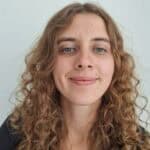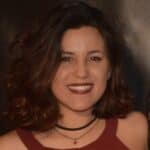Profile
Christina Schoettler
-
About Me:
I have a passion for Astronomy and work as a computational researcher at Keele University. My background is not the classical way into this career as I used to work in industry. I love music and am trying to learn to play the guitar and play the piano (badly). I love the outdoors and have a particular interest in triathlons (swim-bike-run) and have completed several in the past, even though I am not fast.
-
My pronouns are:
she/her
-
My Work:
Computational Astronomer using simulations to investigate the effect that the birth environment has on stars and planets. This environment is usually a star cluster as stars form together with other stars.
-
Read more
I work mainly with simulations, where I use the laws of gravity to investigate the effect many different particles, i.e. stars and planets, have on each other when they interact as it is impossible to calculate this mathematically if you have too many particles, that is the “Three-body problem”.
-
My Typical Day:
I don’t have a typical day, as each of my days is different. As an academic researcher (University environment), I don’t work a fixed 9-5 job, but have more flexibility about where I work and for how long each day. I don’t normally teach students so plan my days around the work I am trying to finish.
-
Read more
In the morning, I check on the progress of my simulations as they can take weeks to finish. My research output is published in academic journals, allowing other researchers to benefit from my work. Sometimes I attend conferences where I give talks about my research or I give a longer seminar talk at another university and interact with the researchers there. My work day consists of a lot of writing, problem solving and coding using the computer language Python.
-
What I'd do with the prize money:
I would spend the prize money on supporting my outreach activities by buying tools to better explain exoplanet detection techniques. Another option would be to fund an Astronomy research project with a local school.
-
Education:
I am German and went to school in Germany all the way to my A-levels, which I took in German, English, Physics and Social studies. Even though I always wanted to become an Astronomer, there was little job security and I decided to study business instead to get a secure job afterwards. However, I always regretted this decision and after I moved to the UK in 2007, I discovered the option to study part-time next to my work and work towards an undergraduate degree in Physical Sciences. After I finished that, I didn’t feel prepared to go to do my PhD straight away and continued with a post-graduate degree in Astrophysics, once again part-time via distance learning. After that was completed, I finally focussed on getting my PhD, as you need this to become a lecturer in Astronomy.
-
Qualifications:
As mentioned before, I have a German educational background, so did not do any GCSEs or O levels. However, I have a German A-level equivalent, which is required to enter university in Germany. My German business degree is equivalent to a Master in Business Administration (MBA). My UK qualifications are all Astronomy related. I have a BSc (Bachelor of Science) in Physical Sciences and a MSc (Master of Science) in Astrophysics. My PhD (doctoral degree) is in Astrophysics.
-
Work History:
After completing my business degree I worked in industry as a product manager for 15 years. I helped develop products for different companies, such as bathtubs and electric garden tools. For 8 years of this job, I also studied alongside. I then went to do my PhD full-time and only did some teaching during this time. After my PhD was completed, I briefly worked at Tesco 🙂 to earn some money as my funding (if you are lucky, you get paid for your PhD). I then worked as a postdoctoral researcher in London at a university and am now in a second position at Keele University. I am still hoping for that (difficult to get) lecturer position at a university.
-
Current Job:
I am currently a postdoctoral researcher at Keele University. My funding comes from the STFC, which is a UK-science body – Sciences and Technologies Facitilites Council. I get paid to do research in my area of interest. I simulate the evolution of a group of particles that have mass under the effects of gravity. Sometimes I also use observational data to compare my simulations to.
-
Employer:
My employer is a university – Keele university. Before this, I was employed at another university (Imperial College London).
-
My Interview
-
What did you want to be after you left school?
I wanted to be an Astronomer, but started studying business as there were only few job opportunities at the time.
Were you ever in trouble at school?
I was a well-behaved student and do not believe I ever got into trouble at school
If you weren't doing this job, what would you choose instead?
That is difficult to answer as this is my second career, so I already decided to change jobs
Who is your favourite singer or band?
I don't have a favourite singer/band and listen to a lot of different music
What's your favourite food?
I am vegetarian and loooove pasta
If you had 3 wishes for yourself what would they be? - be honest!
Find a permanent job as a lecturer at university, be a better guitar player and spend more time on doing triathlons
Tell us a joke.
Knock knock...
-







